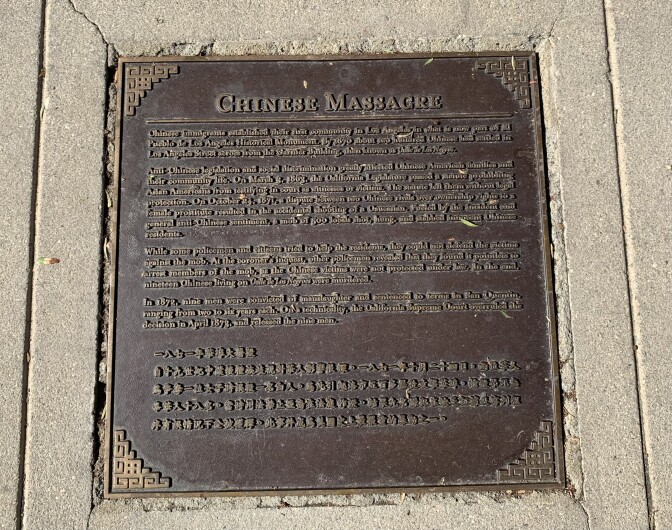This story is free to read because readers choose to support LAist. If you find value in independent local reporting, make a donation to power our newsroom today.
LA Becomes Largest City To Apologize For Atrocities Against Chinese Residents

Los Angeles is the latest — and largest — city to seek amends for past atrocities against Chinese residents.

L.A. Mayor Eric Garcetti this week apologized for a mass lynching of Chinese Angelenos 150 years ago and pledged to get a memorial built to the victims even after he leaves office.
"Because we need to say it: I'm sorry," Garcetti said at Sunday's event commemorating the victims outside the Chinese American Museum.
On Oct. 24, 1871, a gunfight broke out between members of rival Chinese factions. When a white rancher who had entered the fray was killed, a mob of 500 — about a tenth of L.A. — started to hunt down Chinese males. Eighteen were shot or hanged that night. At least another died later from his injuries.
"I'm sorry for the unchecked violence that happened that took the lives of 19 of our fellow Angelenos," Garcetti said.
There were as many wreaths in honor of the victims, draped in black ribbons written with their names. A visibly moved Gay Yuen, board president of the Chinese American Museum, took to the podium afterward and thanked the mayor: "It meant a lot today for you to say those words."

The massacre, the deadliest attack on Chinese people in California, has drawn renewed attention from public officials as anti-Asian violence has risen dramatically during the pandemic, with people of Asian descent being blamed for the "Wuhan virus."
The state Legislature has set aside $2 million to build a memorial garden at the Chinese American Museum, Assemblymember Wendy Carrillo, who represents Chinatown, said at the commemoration event.
The city, meanwhile, has allocated $250,000 to jumpstart a design competition for a memorial to the massacre victims, as well as the resources of the Civic Memory Working Group, which includes historians and indigenous leaders who are re-evaluating how the city interprets and recognizes its often-turbulent history.
Asian American civic leaders are getting help from the city panel as they work to build a memorial.
The 1871 Memorial Steering Committee issued a report last week recommending both temporary and permanent installations, with a stated preference for a permanent fixture on the north side of the 400 block of North Los Angeles Street by the Chinese American Museum. Chinese men hid out in a building in this area, as members of the mob fired inside and dragged people out and threw nooses over them.
The only sign of the incident today is a sidewalk plaque.

Eugene Moy, a member of the steering committee, said that it's important for city officials to recognize the massacre, which he said was a harbinger of other anti-Asian attacks and laws, such as the Chinese Exclusion Act of 1882, which restricted immigration from China.
"I think it's just significant for people to admit flaws or to admit mistakes and that they are going to take steps to correct that problem," Moy said.
This year both the state Legislature and L.A. City Council issued resolutions commemorating the massacre.
The apologies for the 1871 massacre comes after city officials in San Jose in September acknowledged the 1887 destruction of its Chinatown by arsonists.

In May, Antioch officials apologized for the East Bay city's past as a sundown town that banned Chinese residents from walking the streets after dark.
The L.A. memorial is years away from being built and organizers need to raise funds, but they have high hopes for what it will accomplish.
Annie Chu of Chu Gooding Architects pointed to the Sean Collier sculpture on the M.I.T. campus in Boston, built in memory of a campus police officer killed by the Boston Marathon bombers.
"It has both monumentality and intimacy," Chu said. "It has openness and shelter."









